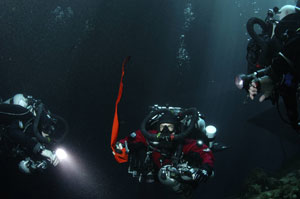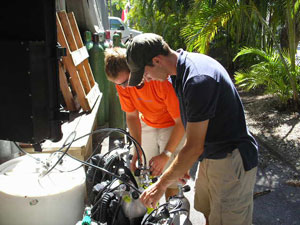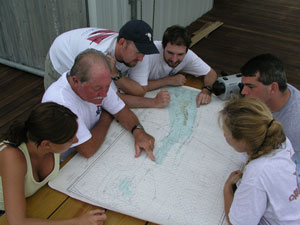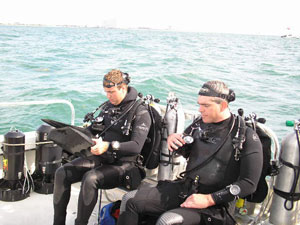Taking The Recreational Diver Into The Technical Realm
Taking The Recreational Diver Into The Technical Realm

I would like to start this essay with a brief overview of our sport. Recreational diving has been around since the 1950s -- that’s close to 60 years. We have seen massive growth within the industry. The number of certified divers is estimated at over 1 million in the USA alone. Along with growing numbers of divers have come equipment manufacturers, travel destinations, and a host of other businesses to facilitate safe diving. During the late 1980s and early 1990s, SCUBA diving went through the largest change in its history. This was the birth of technical diving. Groups and individuals such as the WKPP, Billy Deans, Dick Rutkowski and Bill Hamilton were largely responsible for the early development and techniques. In fact, the name Technical diving came from the first magazine dedicated solely to the sport: “aquaCORPS”, published by Michael Menduno.
 During the early days even diving nitrox was a dark art. DEMA banned any mention of the gas during the early 90s at the trade show. However, over the years, training and equipment became available. Controversy ensued for many years over what procedure or techniques worked best. At the same time, the internet gained popularity. With the ability to communicate very easily, ideas were exchanged and the art of technical diving became a mainstay within our sport. Keep in mind that, if you had signed up for a 200’/60m ocean dive back then, the chance of coming across another diver with the same gear would have been unusual. Today, signing up for the same dive, the industry has moved towards standardized configurations. This is quite something within a few short years. During this essay, I would like to give my views on taking the recreational diver into this arena.
To do this I feel we first have to distinguish between the two. Recreational diving is defined by most agencies as a 130’/40m max depth, with a direct ascent to the surface without a change of gas. Technical diving is normally defined by greater depth, longer bottom time, mandatory staged decompression or a switch to a different gas supply during the ascent. I have listed areas we will discuss for the budding technical diver to ask themselves before signing up for a class.
During the early days even diving nitrox was a dark art. DEMA banned any mention of the gas during the early 90s at the trade show. However, over the years, training and equipment became available. Controversy ensued for many years over what procedure or techniques worked best. At the same time, the internet gained popularity. With the ability to communicate very easily, ideas were exchanged and the art of technical diving became a mainstay within our sport. Keep in mind that, if you had signed up for a 200’/60m ocean dive back then, the chance of coming across another diver with the same gear would have been unusual. Today, signing up for the same dive, the industry has moved towards standardized configurations. This is quite something within a few short years. During this essay, I would like to give my views on taking the recreational diver into this arena.
To do this I feel we first have to distinguish between the two. Recreational diving is defined by most agencies as a 130’/40m max depth, with a direct ascent to the surface without a change of gas. Technical diving is normally defined by greater depth, longer bottom time, mandatory staged decompression or a switch to a different gas supply during the ascent. I have listed areas we will discuss for the budding technical diver to ask themselves before signing up for a class.
- Motivation
- Cost
- Experience
- Instructor
- Training Location
- Training
1. I personally feel motivation is by far the most important aspect to consider when moving away from recreational limits. With this said, I have no problem saying that if I could find historically interesting shipwrecks in 30ft (10m) of water I would never need to go deeper. Unfortunately weather and water over the years turn these shallow wrecks into a widespread and flattened seascape. Hence my personal need for the ability to go deeper or stay longer. It’s just that, the ability to go safely into an environment that we were not meant to -- this is why we obtain the training, buy the gear, etc. It should not be because of the techniques or gaining the badge itself. Everyone will have their own reasons; however, what is critical about these reasons is that they are yours and make complete sense to you and your family. Talking of family, it is folly not to include them in this equation. They have every right to know the risks and benefits this will bring to their lives. The aspiring technical diver should openly ask himself: Have I conducted so many recreational dives that I need to expand my diving? One of the pioneers of DIR said a long time ago that you should be wary of anyone that does not like to reef dive. I think this has a lot of merit when it comes to buddy choice -- not that they have to love looking at pretty fish, but that they still get blown away by the sheer beauty of the underwater realm, no matter how deep or long that dive may have been. I am lucky enough to have a dive on my door step that is 18ft (6m) deep. I can get an hour bottom time, leaving from my house, and be back in the shower within 1. 5 hours. This dive reminds me consistently, what a privilege it is to be able to witness the silent world first hand. What motivates an individual is very much a personal matter, but the ramifications of these motivations can have life changing results on those around us who care for us.
2. Cost. This sport is not cheap. I personally gave up counting the money a long time ago, when over the course of one year I spent nearly $5,000 on boat charters alone and never left the country -- it became quite scary. I chose not to bring money into it. If one focuses on the cost, it may affect their decision making and hence their over all safety. Making the correct choices about gear that will grow with you as a diver will make sure all funds are spent wisely. The dive industry has, over the last twenty years, shortened classes to include only the minimum requirements. This has led to more divers taking up the sport, but in turn more dropping out, many due to feeling inadequately trained and prepared. Instructors are pushed into charging less money to stay competitive, and this leads to a vicious circle of more bad classes. The cost of instruction should be little concern over all, as this is what gives the recreational diver their first glimpse of the tech arena. If the first technical class is taught by a qualified instructor, both in terms of dive ability and teaching prowess, then the student stands the best chance of staying with the sport. If an instructor looks at the financial side of things and sees he is making less than minimum wage, what kind of class is he going to teach or how long till he quits altogether? Gear should be the best quality you can find, with the best warranty available. This is the easiest part of the new technical diver to build, as we dive a standard set of gear. The only changes will be made for environmental concerns and minimum gas requirements. After looking at the cost of instruction and gear, we have the ongoing costs of service, dive fees and gas. Again all the above should be the best available. Going cheap on helium is not the way forward. Nor, for that matter, is waiting till a regulator leaks before getting it serviced.
 3. Experience. It may surprise some that the skill set necessary for a safe recreational dive is the same as those for a technical dive. Basic buoyancy, trim and situational awareness are the mark of a good technical diver. However, we also need the ability to deal with stress to a higher degree, plus being able to think through problems in a logical fashion. After witnessing and teaching many technical classes over the last 12 years or so, I would say that having a stable platform in the water is the first step in moving towards becoming a technical diver. Without this platform, divers tend to conduct a wonderful rendition of the deco dance, where they spin and kick their way around their buddy throughout the entire dive. When this training first became commercially available, the divers that took classes were normally involved in deep or longer dives. They had massive experience to pull from, and the training allowed them to perform the dives in a safer manner. Today I see a lot of individuals that barely meet minimum requirements. While the industry has to put numbers on minimum amount of dives required, your own dive experience should be quite varied in nature. It was once said, “Experience is something you don’t have till you need it.” No class can give the diver experience. The class is an open door to walk through, to get your experience over time and in different conditions.
3. Experience. It may surprise some that the skill set necessary for a safe recreational dive is the same as those for a technical dive. Basic buoyancy, trim and situational awareness are the mark of a good technical diver. However, we also need the ability to deal with stress to a higher degree, plus being able to think through problems in a logical fashion. After witnessing and teaching many technical classes over the last 12 years or so, I would say that having a stable platform in the water is the first step in moving towards becoming a technical diver. Without this platform, divers tend to conduct a wonderful rendition of the deco dance, where they spin and kick their way around their buddy throughout the entire dive. When this training first became commercially available, the divers that took classes were normally involved in deep or longer dives. They had massive experience to pull from, and the training allowed them to perform the dives in a safer manner. Today I see a lot of individuals that barely meet minimum requirements. While the industry has to put numbers on minimum amount of dives required, your own dive experience should be quite varied in nature. It was once said, “Experience is something you don’t have till you need it.” No class can give the diver experience. The class is an open door to walk through, to get your experience over time and in different conditions.
4. Instructor. The choice of instructor can be a little daunting at first. Here are some areas to check before making that choice: How much time does the instructor have personally diving at this level? How often do they teach this class? Can you talk with others that have taken a class from this instructor? Is the instructor still challenging himself diving? How long have they been teaching diving at any level?
5. Training Location. During the last few years I have changed my mind on this subject. I used to subscribe to the theory of train where you dive. Today I would strongly suggest the student look at logistics first. By this, I mean that, if we are going to spend five days on a GUE Tech I class and during those five days spend several hours driving from the store to the dive site and back all, these lost hours will do at least two things. First, take time away from the class, and second, fatigue the diver far more quickly. Gone are the days of GUE training lasting 14 to 15 hours per day. Now we keep the class moving ahead at the students’ pace, while maxing out at 10 to 12 hours (including time for lunch). Now, factor in a two hour drive, an extra hour for trying to get tanks filled, and you have a very tired diver -- which in turn leaves the student unable to absorb the information. Logistics are a very important area to talk with your instructor about before the class starts. As you have no doubt guessed, it’s very important for the students to take responsibility for themselves from the start. If you are the kind of person that takes a huge amount of time to assemble gear and get dressed, you should start early so as not to hinder the team. It’s the same with math and pre-class study. Coming to class not having read the pre-class materials is recipe for disaster. While these are not math classes, there is math within the curriculum. If this presents issues, start early and ask the instructor for help before the class. This way you will be more comfortable during the class and able to move forward at a relaxed pace.
 6. Training. We can look at many aspect of training -- some examples are as follows. Being physically fit will benefit us in many ways, from a healthy life to being able to deal with stress to a greater degree. Starting the class after traveling half way around the world is hard at best; leave yourself enough time to reduce fatigue. If you have not dived with your classmates before, allow a day to get to know each other. Better still, set up a workup dive to conduct weight checks and run over basic drills. I have witnessed many divers wanting to obtain technical training, who have trained a great deal before the class starts. On many occasions, these well meaning divers train bad habits or wrong procedures that have to be relearned during the class. I would strongly suggest to any diver wanting to move forward in their diving, that they concentrate on the basics: buoyancy, trim, safety drills, valve drills, use of primary light and situational awareness. If these skills are rock solid, then adding to the divers skill set is manageable within the class. If not, then we may be in for an unpleasant surprise. Take time to smell the coffee -- by this, I mean after the successful completion of your class, take time to build a solid foundation. For example, those who have heard of Ginnie Springs may be familiar with an area of the cave called the Gallery. This is, in fact, the first few hundred feet of the cave system. In my opinion, this is one of the prettiest places in the Devils system -- yet most divers burn through this area without even so much as a glance. I would go as far as saying that if this area was 3500’ back in the cave, it would be one of the most popular dives in that cave. I have spent a lot of time hanging out in the top of this area, just watching as divers move through. What I am trying to say is that you don’t have to go to the limits of your class standards to get a great dive -- slow down and enjoy the ride. Moving forward too fast will leave gaps in your experience that will not show up until you are deep, or a long way from home. Remember, gaining time within this new arena of diving slowly will pay dividends in the end. Just as finishing cave training and then putting on multiple stages and scooters is foolhardy, so is going to that wreck far offshore until you have plenty of time under your belt. With the correct mind set and solid skill set you have most of the continental shelf at your disposal and a lifetime to enjoy it.
6. Training. We can look at many aspect of training -- some examples are as follows. Being physically fit will benefit us in many ways, from a healthy life to being able to deal with stress to a greater degree. Starting the class after traveling half way around the world is hard at best; leave yourself enough time to reduce fatigue. If you have not dived with your classmates before, allow a day to get to know each other. Better still, set up a workup dive to conduct weight checks and run over basic drills. I have witnessed many divers wanting to obtain technical training, who have trained a great deal before the class starts. On many occasions, these well meaning divers train bad habits or wrong procedures that have to be relearned during the class. I would strongly suggest to any diver wanting to move forward in their diving, that they concentrate on the basics: buoyancy, trim, safety drills, valve drills, use of primary light and situational awareness. If these skills are rock solid, then adding to the divers skill set is manageable within the class. If not, then we may be in for an unpleasant surprise. Take time to smell the coffee -- by this, I mean after the successful completion of your class, take time to build a solid foundation. For example, those who have heard of Ginnie Springs may be familiar with an area of the cave called the Gallery. This is, in fact, the first few hundred feet of the cave system. In my opinion, this is one of the prettiest places in the Devils system -- yet most divers burn through this area without even so much as a glance. I would go as far as saying that if this area was 3500’ back in the cave, it would be one of the most popular dives in that cave. I have spent a lot of time hanging out in the top of this area, just watching as divers move through. What I am trying to say is that you don’t have to go to the limits of your class standards to get a great dive -- slow down and enjoy the ride. Moving forward too fast will leave gaps in your experience that will not show up until you are deep, or a long way from home. Remember, gaining time within this new arena of diving slowly will pay dividends in the end. Just as finishing cave training and then putting on multiple stages and scooters is foolhardy, so is going to that wreck far offshore until you have plenty of time under your belt. With the correct mind set and solid skill set you have most of the continental shelf at your disposal and a lifetime to enjoy it.
Dean Marshall
GUE Instructor

